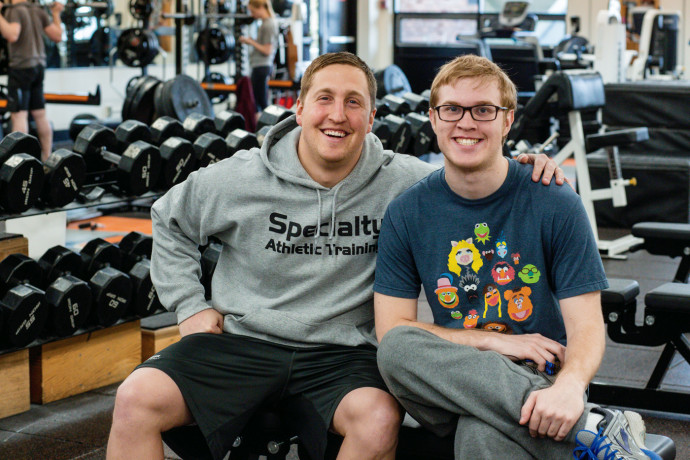Training Clients with Special Needs
Ryan Lockard BA ’07
Ryan Lockard is used to turning setbacks into triumphs.
During the third football game of his senior year at Lewis & Clark, he tore his ACL, an important ligament in the knee. Unwilling to accept defeat, he applied for an NCAA medical redshirt exception that would give him time to heal with the hope of playing another year.

Lockard zeroed in on academics and his recovery and also started checking out Craigslist ads for work. One ad, in particular, caught his eye: Parents of a 13-year-old autistic boy needed one-on-one help for their son, Ben. Lockard accompanied the young teen to all his middle-school classes, building rapport and learning about his love of Disney movies and SpongeBob SquarePants. “He felt safe opening up to me,” remembers Lockard.
During PE class, Ben was required to run warm-up laps, but he’d often get extremely agitated and stop. His progress really took off when Lockard discovered what was holding Ben back: “It came down to a simple thing, really—he didn’t like to sweat. No one ever explained to him what causes your body to sweat, so it freaked him out.” When he learned that it’s the body’s way of cooling down, Ben agreed to deal with his discomfort and trust Lockard that everything would be all right.
“Ben is 23 now and still works out with us four days a week,” says Lockard, founder and head trainer of Specialty Athletic Training. “He’s like a little brother to me.”
Lockard manages two Specialty Athletic Training locations in Portland and one in Vancouver, Washington. He also runs the physical education program at Portland’s Bridges Middle School, an independent school designed for kids with learning differences. In addition, he volunteers as an assistant strength and conditioning coach at Lewis & Clark and serves on the board of the Autism Society of Oregon.
Lockard’s training sessions are always upbeat and positive. Workouts often include a combination of cardio and weight training based on the client’s interests and abilities. “We want our clients to gain confidence and independence,” he says.
A natural athlete, Lockard grew up in Creswell, Oregon, where he played football, baseball, and basketball in high school. Recruited to play Pioneer football, he forged a brotherhood with fellow players and found a mentor in then coach Chris Sulages.
“During my junior year, my dad was deployed in Kuwait with the Navy,” he says. “Coach Sulages stepped in as a father figure, helping me through that tough time.” Lockard went on to play three seasons of football overseas in Orléans, France; Slagelse, Denmark; and Warsaw, Poland. His first season in France was a sink-or-swim experience. “Being the only American made me more self-aware,” he says. “I had to learn to be comfortable being uncomfortable.”
Former teammates have been instrumental advisors as he continues to grow his business. One in Poland is helping him set up his first European workshop. Lockard also plans to share his expertise on college campuses in the States.
Back at Lewis & Clark, home to one of his Portland locations, he frequently involves clients in Pioneer sports activities. They’ve played basketball during halftime and have been bat boys and girls at baseball games, as well as ball “shaggers” at volleyball games.
Specialty Athletic Training’s team has a family vibe. Lockard’s wife, Mary Moore, is the company’s creative director. Andrew Traver BA ’15, a four- year letter winner in football and baseball who went on to play football in Germany, is the company’s lead trainer at the Lewis & Clark location. Personal trainer Alex Jones BA ’17 played men’s basketball at L&C and hopes to pursue a career in health care.
For Lockard, providing Lewis & Clark students with sports-related internships has been gratifying. Together they’ve raised clients’ expectations and boosted their confidence. “Statistically, individuals with special needs are more likely to encounter health issues,” he says. “Making exercise fun and informative helps them stay active and engaged.”
—by Pattie Pace
More L&C Magazine Stories
Lewis & Clark Magazine is located in McAfee on the Undergraduate Campus.
MSC: 19
email magazine@lclark.edu
voice 503-768-7970
fax 503-768-7969
The L&C Magazine staff welcomes letters and emails from readers about topics covered in the magazine. Correspondence must include your name and location and may be edited.
Lewis & Clark Magazine
Lewis & Clark
615 S. Palatine Hill Road MSC 19
Portland OR 97219

